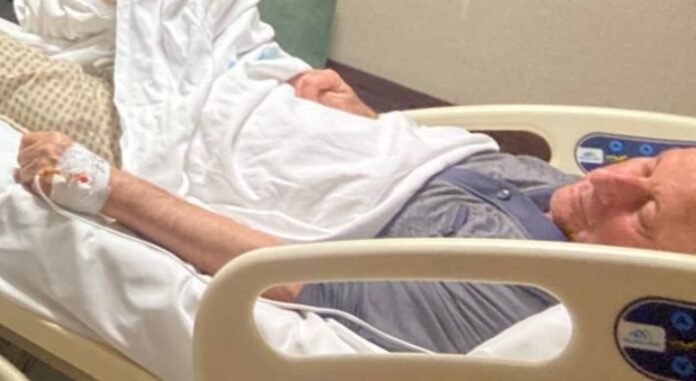Social media users have since Monday been calling on Turkish authorities to release İbrahim Güngör, a 72-year-old Alzheimer’s patient who was imprisoned in December to serve a sentence on conviction of alleged links to the faith-based Gülen movement.
During a recent visit Güngör failed to recognize his 24-year-old daughter, Sueda, who described her father as disoriented and physically frail. The family has appealed to authorities for his immediate release, as is provided for by law.
According to Law No. 5275, the sentence of a prisoner who due to a serious illness or disability is unable to manage life on their own under prison conditions and who is not considered a serious danger to society may be suspended until they recover. However, the stipulated suspension of sentence is often not implemented.
Güngör’s Alzheimer’s had worsened significantly within a month of imprisonment. He no longer recognized his family members and spoke of events that had never occurred.
Güngör, sentenced to over eight years, was arrested on December 14, 2024 and sent to prison in İzmir after Turkey’s Supreme Court of Appeals upheld his conviction.
Turkish President Recep Tayyip Erdoğan has been targeting followers of the Gülen movement, inspired by the late Muslim cleric Fethullah Gülen, since corruption investigations revealed in 2013 implicated then-prime minister Erdoğan and some members of his family and inner circle.
Dismissing the investigations as a Gülenist coup and conspiracy against his government, Erdoğan designated the movement a terrorist organization and began pursuing its members. He intensified the crackdown on the movement following a failed coup in 2016, which he accused Gülen of masterminding. Gülen and the movement strongly deny involvement in the coup attempt or any terrorist activity.
According to family members, Güngör is being held in a one-person cell, which has compounded his condition. He also told his family that there weren’t regular checks on his well-being.
Güngör’s family raised concerns about other health problems as well. He also suffers from prostate issues and diabetes, requiring a catheter and close medical attention.
Before his imprisonment, he had undergone brain surgery in 2022 for hydrocephalus, an abnormal buildup of cerebrospinal fluid deep within the brain, and a shunt was implanted to alleviate the pressure.
His daughter had previously described the unsanitary conditions of his confinement as unsuitable for someone in his condition. “He can’t manage basic personal care like bathing or changing clothes,” she said. “At home, he couldn’t even use the bathroom alone due to balance issues. If he falls in that cell, no one will be there to help him. We fear for his life.”
Güngör was initially arrested in January 2019 for hosting religious gatherings with the members of the Gülen movement, encouraging participation in movement activities and collecting donations for students. He was director of student affairs at İzmir Gediz University, a Gülen-linked institution that was closed under a government decree after the 2016 coup attempt.
After spending 10 months in jail, Güngör was released pending trial, reporting regularly to the police. According to his family, these requirements were lifted 10 months ago due to his deteriorating health.
The family has filed for a postponement of his sentence based on his health, but no decision has yet been made. Sueda said her father’s imprisonment has been devastating for their family. “We’re watching him waste away in a place where he doesn’t belong. He’s a kind, gentle man who loved helping students. This isn’t justice.”
Turkish authorities have been frequently criticized for their systematic disregard of the health needs of prisoners. Every year, rights groups report the deaths of dozens of sick prisoners, either while behind bars or shortly after their release, which often comes at the end-stage of their illness. Turkey recorded 709 deaths in prison in the first 11 months of 2024, according to data from the Ministry of Justice shared in response to a parliamentary inquiry.















